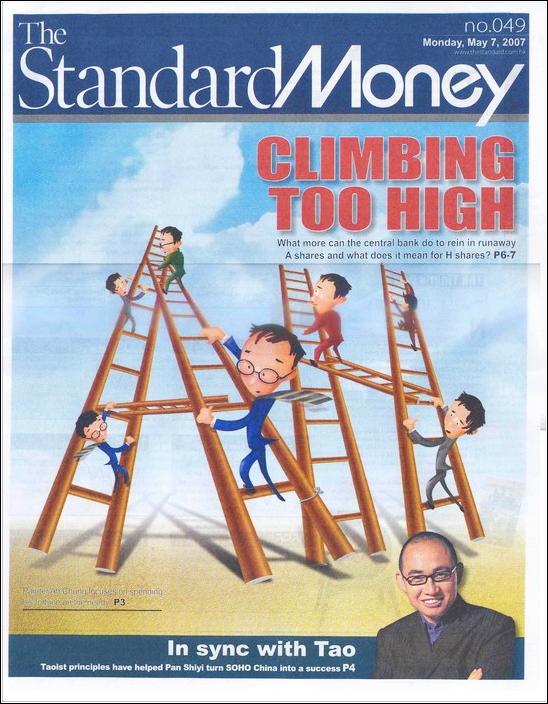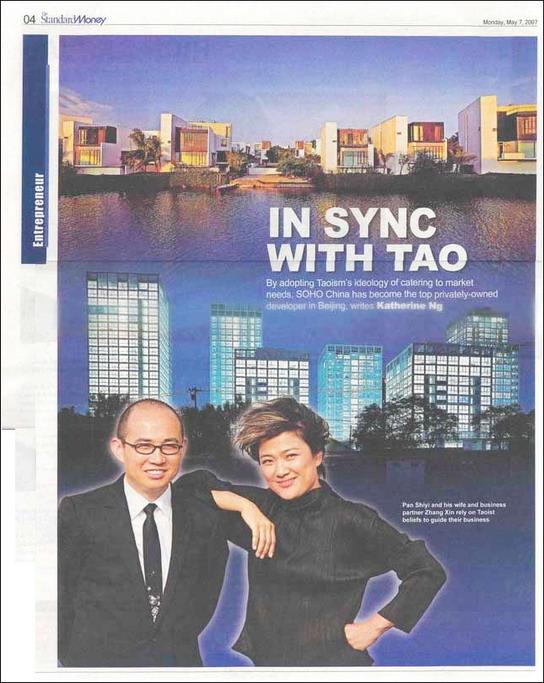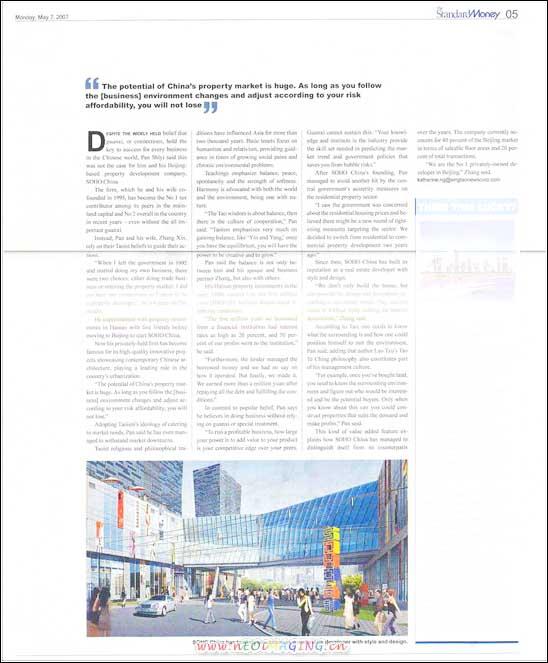


By adopting Taoism s ideology of catering to market needs, SOHO China has become the top privately-owned developer in Beijing, writes Katherine Ng
Despite the widely held belief that guanxi, or connections, hold the key to success for every business in the Chinese world, Pan Shiyi said this was not the case for him and his Beijing- based property development company, SOHO China.
The firm, which he and his wife co- founded in 1995, has become the No 1 tax contributor among its peers in the mainland capital and No 2 overall in the country in recent years - even without the all important guanxi.
Instead, Pan and his wife, Zhang Xin, rely on their Taoist beliefs to guide their actions.
"When I left the government in 1992 and started doing my own business, there were two choices: either doing trade business or entering the property market. I did not have any connections so I chose to be a property developer," the 44-year-old Pan recalls.
He experimented with property investments in Hainan with five friends before moving to Beijing to start SOHO China.
Now his privately-held firm has become famous for its high-quality innovative projects showcasing contemporary Chinese architecture, playing a leading role in the country s urbanization.
"The potential of China s property market is huge. As long as you follow the [business] environment changes and adjust according to your risk affordability, you will not lose."
Adopting Taoism s ideology of catering to market needs, Pan said he has even managed to withstand market downturns.
Taoist religious and philosophical traditions have influenced Asia for more than two thousand years. Basic tenets focus on humanism and relativism, providing guidance in times of growing social pains and chronic environmental problems.
Teachings emphasize balance, peace, spontaneity and the strength of softness. Harmony is advocated with both the world and the environment, being one with nature.
"The Tao wisdom is about balance, then there is the culture of cooperation, "Pan said. "Taoism emphasizes very much on gaining balance, like Yin and Yang, once you have the equilibrium, you will have the power to be creative and to grow."
Pan said the balance is not only between him and his spouse and business partner Zhang, but also with others.
His Hainan property investments in the early 1990s earned him his first million yuan (HK$1.015 million) despite harsh financing conditions.
"The five million yuan we borrowed from a financial institution had interest rates as high as 20 percent, and 50 percent of our profits went to the institution," he said.
"Furthermore, the lender managed the borrowed money and we had no say on how it operated. But finally, we made it. We earned more than a million yuan after repaying all the debt and fulfilling the conditions."
In contrast to popular belief, Pan says he believes in doing business without relying on guanxi or special treatment. "To run a profitable business, how large your power is to add value to your product is your competitive edge over your peers. Guanxi cannot sustain this. "Your knowledge and instincts in the industry provide the skill set needed in predicting the market trend and government policies that saves you from bubble risks."
After SOHO China s founding, Pan managed to avoid another hit by the central government s austerity measures on the residential property sector.
"I saw the government was concerned about the residential housing prices and believed there might be a new round of tightening measures targeting the sector. We decided to switch from residential to commercial property development two years ago."
Since then, SOHO China has built its reputation as a real estate developer with style and design.
"We don t only build the house, but also provide the design and decorations according to our clients needs. They can just move in without delay waiting for interior decorations," Zhang said.
According to Tao, one needs to know what the surrounding is and how one could position himself to suit the environment, Pan said, adding that author Lao Tzu s Tao Te Ching philosophy also constitutes part of his management culture.
"For example, once you ve bought land, you need to know the surrounding environment and figure out who would be interested and be the potential buyers. Only when you know about this can you could construct properties that suits the demand and make profits," Pan said.
This kind of value added feature explains how SOHO China has managed to distinguish itself from its counterparts over the years.
"We are the No 1 privately-owned developer in Beijing," Zhang said.
Related News
Photos
More>>trade
- South China Morning Post - SOHO China to expand after winter sleep
- China Daily - SOHO China to capitalize on weak property market
- China Daily - Soho gets 10b yuan credit line
- South China Morning Post - Pan Shiyi and wife wax philosophical this New Year
- China Daily - 2008 Entrepreneur of the Year awards





